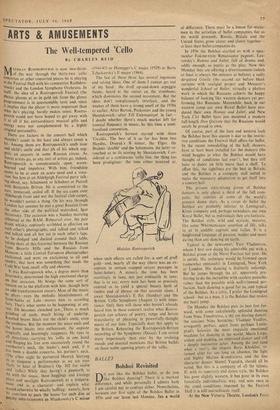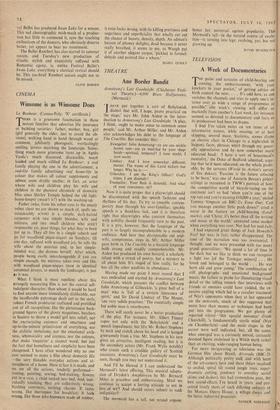BALLET
Bolshoi Revisited
Do you like the Bofshoi ballet, or do you like Bolshoi dancing? There is a marked difference, and while personally I admire both I am careful not to confuse either. Nevertheless, between our first sight of the Bolshoi Ballet in 1956 and our latest last Monday, lies a world
of difference. There must be a lesson for states- men in the activities of ballet companies, for as the world proceeds, Russia, Britain and the United States grow closer and closer together— at least their ballet companies do.
In 1956 the Bolshoi startled us with a spec- tacular Fokine-style Renaissance pageant, Lay-
rovsky's Romeo and Juliet, full of drama and, oddly enough, as poetic as the play. Now this Monday they are offering a divertissement (which at least is always the mixture as before), a sadly de-gutted Giselle (the second act before black curtains with vestigial props) and Messerer's wonderful School of Ballet, virtually a plotless
work in which the Russians achieve the happy balance of looking like western dancers yet per- forming like Russians. Meanwhile, back in our
western camp our own Royal Ballet have pro- duced their own Romeo and Juliet, and New York City Ballet have just mounted a modern full-length Don Quixote that the Russians would surely be proud to own.
Of course, part of the lean and western look the Bolshoi have this season is due to the restric- tive conditions the Festival Hall offers for ballet.
In the recent remodelling of the hall, showers have at least been installed for the dancers (the mind boggles at what the Bolshoi would have thought of conditions last year!), but they still have to dance on little more than a shelf. To offset this, the sightlines are the best in Britain, and the Bolshoi is a company well suited to make the necessary adaptation to get itself into a concert hall.
The present sixty-strong group of Bolshoi dancers is only about a third of the full com- pany. but consists of some of the world's
greatest dance stars. As a corps de ballet the Bolshoi are probably inferior to Leningrad's
Kirov company and, perhaps nowadays, our own Royal Ballet, but as individuals they are fantastic. The Bolshoi style, wild and ecstatic, massive, like some Whitmanesque assertion of life,, talks to us in audible capitals and italics. It is a heightened language of passion, bolder and more daring than any dancing on earth.
Typical is the newcomer, Yuri Vladimirov, whom 1 first saw doing his admirable nut with a Bolshoi group at the Nervi Festival last year. He is untidy. His technique would be frowned upon (somewhat enviously) in Leningrad, New York or London. His dancing is distinctly unkempt.
But he jumps through the air, apparently pre- ferring to do the incredible with careless panache, rather than the possible with well-trimmed per- fection. Such dancing is good for us, and typical of the Bolshoi. As a critic. 1 prefer the Leningrad school--but as a man, it is the Bolshoi that makes my heart jump.
On Monday the Bolshoi puts its best feet for- ward, with some calculatedly splendid dancing from Nina Timofeyeva, a shy yet blazing dancer: the succinct Nina Sorokina; Vladimir Vasiliev, arrogantly perfect. apart from perhaps Lenin- grad's Soloviev the most exquisite emotional machine for dancing in the world; Mans Liepa, ardent and dashing. an improved dancer and still a deeply instinctive actor. Among the rest (and what a rest!), the elegant Boris Khoklov. re- turned after far too long an absence, the light and flighty Marina Kondratieva and the fine character dancer Sharnil Yaaudin, should all be noted. But this is a company of all the talents. If, with its repertory and dance style, the Bolshoi has gone slightly western, it has gone in its own forcefully individualistic way, and seen even in the cruel conditions imposed by the Festival Hall it is still marvellously itself.
At the New Victoria Theatre, London's Festi-
val Ballet has produced Swan Lake for a season. This sad choreographic mish-mash of a produc- tion has little to commend it, save the touching enthusiasm of the dancers, who obviously deserve better, yet appear to bear no resentment.
The Ballet Rambert has also started its summer season, and Tuesday's new production of Giselle, stylish and exquisitely suffused with Romantic agony, is, unlike Festival Ballet's Swan Lake, everything a classical revival should be. This too-brief Rambert season ought not to be missed.
CLIVE BARNES

















 Previous page
Previous page